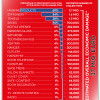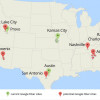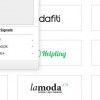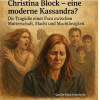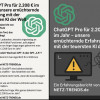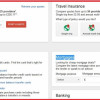
WOT Web of Trust is still not entirely trustworthy
The aim of WOT – Web of Trust is very valid: to provide guidance on the internet. With the help of Mozilla Firefox, the add-on “WOT – Web of Trust” promises to guide you safely through the depths of the internet. In order to do that, WOT runs every website through unified categories.
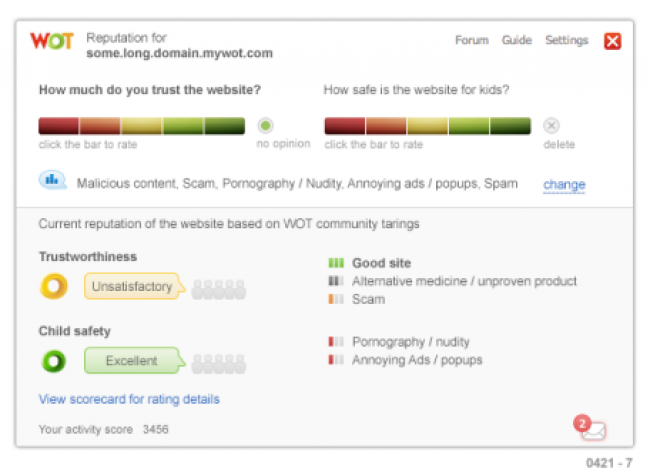
According to the "WOT - Web of Trust" website (mywot.com), it already has more than 110 million worldwide users, going up from about 35 million in mid-2012. Therefore, this could be called a web-story of success. However, there are several points of criticism regarding WOT – Web of Trust, saying that WOT would be rather dubious. Netz-Trends would like to explain some of these points of criticism in this article.
Mid-2012, there were four main, equally weighted criteria. Websites were judged based on Trustworthiness, Vendor Reliability, Privacy and Child Safety. Back then, a lot of voices thundered against WOT on the internet, saying that these criteria are way too general and that a lot of websites do not fit the queried or assigned ratings.
Once you have downloaded the WOT add-on, you can quite randomly not only judge and condemn websites but you are also faced with WOT’s judgement of the internet – nevermind it fitting the website or it being representative to some extent or not. So what can happen is that relatively few negative votes, even of websites with millions of unique users every month, can lead to a website receiving a red warning sign by WOT.
Boldly painting everything black and white
WOT – Web of Trust paints the internet world boldly in black and white, dividing it in good and bad. If a website has a certain number of negative votes, a dramatic “Warning” sign covering the entire screen pops up and screams right into the face of the bewildered website user. The exclamation mark at the end of the words “Warning! – This website has a negative reputation based on user votes” in huge font seems like a shooting sheriff at a traffic crossing.
WOT – Web of Trust has hit the forementioned website, thanks to the add-on in Mozilla Firefox, Internet Explorer or Google Chrome. It additionally wraps the website in a seemingly impenetrable veil of a milky dark-gray colour. WOT – Web of Trust doesn’t just recommend using certain websites but in many cases mutates into an aggressive attack against a website, first and foremost trying to prevent the user from doing one thing: form their own unbiased opinion about a website.
You could almost receive the following impression: Whoever now goes one tiny step further – by going to the website marked with a warning sign – walks right into disaster, an internet disaster created by a website which actually should be shut down. This is one interpretation of the axe that WOT – Web of Trust seems to be wielding. But is this really the case? Nobody knows. The website does not disclose how many votes have actually been submitted.
The general impression is that in WOT only a few dozen votes seem to be enough to send a home page – even with a million users per month – over to the allegedly dark side. It is strange that even after several tests we cannot fend off the assumption that, at the end of the day, your own vote has zero impact on the ranking of a website. The question that arises is: does WOT – Web of Trust act according to its own rules?
A huge question mark
The more accurate impression is that you have no influence on votes, even if several colleagues or friends vote via different IP addresses.
And even if there are 100 comments regarding one website: What do 100 comments mean if a website has two million users per month? It is known that many people use the comment feature in WOT to let out their frustration about a website. Some users straight away copy their comments regarding one website to publish them for several websites which might belong to one company – even if the business model of one website doesn’t have anything to do with the other.
On Wikipedia, there are 20 year old administrators who can quite autocratically change, interfere with or promote texts – even if they are not competent in an area. Who are the administrators of WOT, what makes them competent, independent, trustworthy and fair? How many of them are there? Where are they? How did they become administrators for WOT? We don’t know.
Rumours about manipulation do not fade away but become louder
If WOT acted similarly transparent as Facebook or Google in its social media section it would be much easier to prevent that even the slightest impression is created that WOT is a dubious organisation.
We’re not entirely convinced that WOT conveys the impression that this one tool can practically judge millions of websites and Google advertisements. There is no other way to explain why, after the installation of the WOT add-on, domain names or Google advertisements would be rated with red or green circles everywhere on the internet.
It’s about time to look at WOT – Web of Trust a lot more critically than in the past since WOT is growing each month by almost a million users.
A legitimate benchmark is different
Other rumours also inspire little confidence: apparently, there would be freaks existing who wrote programmes which automatically and on a regular basis would give certain websites the worst possible ratings on WOT. Is really everything done to inhibit this? WOT says yes. However, WOT has not managed to convince us of this until this point.
Wherever we look, the arbitrary system is a striking feature during our WOT test, manifesting itself in the unified randomness and for many websites irrelevant criteria that a website is categorised by. Why flight booking websites are checked for child safety is just as mysterious as many things in WOT.
Paint everything with the same brush
We’re also not entirely convinced that only a few votes are enough to accuse a website of being spam or even fraudulent - but it seems that exactly that is possible in WOT.
Again, WOT lacks trustworthy transparency. It should for example be possible to legitimately prove how many users have clicked one criterion. It would be even better if more criteria were added – for example the Alexa value of website, the Google PageRank or the numbers of unique users. These could be used to develop a relativity formula in order to show the user the relative size of the number of votes regarding a websites.
WOT tries to be almighty and acts dubiously with exactly this aspiration. With the lack of transparency, WOT practices exactly what WOT suspects other websites to do: shady work. This does not help the world of the internet, though. It in fact creates worries for the users and trouble with countless trustworthy website providers.
More rumours: have negative votes higher impact?
What remains is a flavour of mistrust when WOT says the rating of a website is meant to help the website’s user to learn "how much other users trust this site". Even if WOT hides the fact that the ratings are not entirely representative in the small print behind a tiny link somewhere it is unsure that anyone ever looks at it …
Other rumours which do not raise trust in WOT – Web of Trust: In US blogs that we read it was mentioned that one negative WOT rating possibly has to be followed up by at least 15 positive ones.
Somebody from WOT not further introduced has commented on a US blog as follows: "Users have to earn the system’s trust before their ratings gain weight, which is why creating multiple accounts and spamming ratings for a site has very little impact on the reputation." Oh right: So the people responsible for WOT decide who is allowed to vote and who isn’t, and decide which rating is weighted and which isn’t.
Hundreds of millions of websites – and WOT seems to know them all...
There are hundreds of millions of websites on the internet – but WOT – Web of Trust just like a god seems to know them all. No matter where you look: WOT gives out their green/orange/red recommendation or warning badges everywhere. That is applicable even to Google ads which WOT can of course immediately classify despite ad keywords changing on a daily basis. WOT’s megalomania has no boundaries. The company seems to dream of the omnipotence of the colourful WOT smarties on the web and is getting closer and closer to this aim thanks to being an accepted add-on for Mozilla Firefox, Google Chrome or Internet Explorer.
As we found out, there are several companies in the USA who are preparing a law suit against WOT – Web of Trust to fight against the, in their opinion, “dubious rating wheelings and dealings of the website.” Increasingly, German companies, too, have similar considerations. This should not be an easy endeavour since, as commonly known, freedom of speech has wide wings. WOT masterminds are aware of this as well and hide behind the principally important good that is freedom of speech. Additionally, they hide behind the legally hard to catch type of company that constitutes a "Limited".
Despite the threat of additional law suits, it wasn’t long ago that WOT Services Ltd. was able to celebrate a first partial success in the US, the country in which everything is possible, as you know. A court in Florida has failed to see any misconduct on the part of WOT in a case in which a company has sued WOT.
However, rumours have it that the plaintiffs had committed several procedural errors. The suing company’s allegations included but were not limited to defamation, violating rights, conspiracy and manipulating algorithms.
During the lawsuit, WOT – Web of Trust referred to an antiquated US internet law from the year 1996, article 230 of the Communications Decency Act. This article protects internet companies and their content quite comprehensively and generally. In the industry though, the verdict is controversial since the court obviously hasn’t completely seen through the humbug of the WOT system. WOT – Web of Trust still cheers the verdict saying that it was “very important for WOT even though the accusations against WOT” were “absolutely baseless” anyway. Is it?
WOT happy about US system of justice
The Chief Executive Officer of WOT Services Ltd., Vesa Perälä, expressed in writing that the US verdict “clearly shows” that freedom of speech is enthroned above everything else in the USA and therefore the actions of WOT conform completely to the law. It is a known fact that courts in the US hardly draw clear boundaries between the propagation of opinions or allegations and is deemed to be a huge deficit of the US legal system. According to press law for example, both celebrities and non-celebrities have to put up with photographers flying across their gardens and taking intimate photographs which are then distributed all over the media.
In countries like Germany, this is unthinkable. In a statement regarding the US verdict, WOT – Web of Trust regretted that the European system of law views things more refined than in the US and that in Europe not everything can be distributed just like that. Since the arbitrariness of the WOT – Web of Trust system is obvious, companies claiming e.g. in Germany against WOT – Web of Trust could have better chances than in the USA.
WOT used to sell a “Trust Seal” for up to €598
Adding to the discussion is the fact that WOT – Web of Trust used to sell homepages a “WOT Trust Seal” for up to €598 homepages (mywot.com/en/trustseal/comparison) until October 2013. However, this Trust Seal did not raise trust for WOT on the internet since a lot of people were asking the following question: How does it go together that WOT wants to act independently on the one hand and, on the other hand, has users hand over money for good ratings?
This question remains unanswered. However, WOT now state on their homepage: “Dear customers we have discontinued Trust Seal and Reputation Badge programs. Starting from 23.10.2013 we won't accept any new orders. Active Seals and Badges will work normally until the current subscription ends. Thank you for your interest in our products.”
WOT used the following arguments to justify its Trust Seal and to make it tempting for companies: “Consumers are concerned about the safety of their online transactions. The WOT Trust Seal shows visitors that your site is trusted by a community of millions of web users based on their real-world experiences. Trust generates business […] WOT reputation ratings are powered by a global community of millions of trustworthy Internet users who have rated millions of websites based on their experiences.”
This also shows like many other examples that WOT does not quite act kosher. It seems hardly believable that all WOT voters are “trustworthy internet users.” In fact, website providers know that WOT can be used well to talk down the competition or to praise own products to the skies.
For a long time rumours circulated on the internet that websites could allegedly purchase the WOT Trust Seal to possibly improve their listing on the WOT homepage. We sent an email in 2012 regarding these rumours, however, we never received a response. In any case, this matter seems to have resolved itself since the Seal is not sold by WOT anymore.
We also read the following statements of a WOT spokesperson in a US blog: "Reputations are not for sale. In fact, you can only buy a Trust Seal if your site has already earned a good reputation, and should the reputation go bad in future, you will lose the Trust Seal." They carry on: "WOT doesn’t rate websites and has no incentive to rate sites poorly in order to sell you something."
Did you like our article? If so, please also pay attention to our advertisements. If you find any of them interesting feel free to click on them. Only publishing advertisements will not help us pay our authors, it's the clicks that count! Thank you!
Conclusion Netz-Trends to WOT Web of Trust
Our conclusion for WOT therefore: netz-trends.de cannot help but pass a hard judgment about WOT. We have the strong feeling that WOT – Web of Trust cannot entirely be trusted in its current state.
We understand WOT’s objective to help the user judge websites better. However, we are simply not convinced by neither the WOT system of the past nor the present one. We are not convinced by it being representative nor do we feel that website providers are treated fairly. The least convincing for us are WOT’s aggressive warning signs which, in our opinion, border on censorship and in some cases even defamation. In any case, the current system with its general criteria and the lack of transparency is no real help to users.
There is still a lot of work to be done if WOT wants to be recognised as a fair assistant in the vastness of the internet by both the users and the affected websites.

